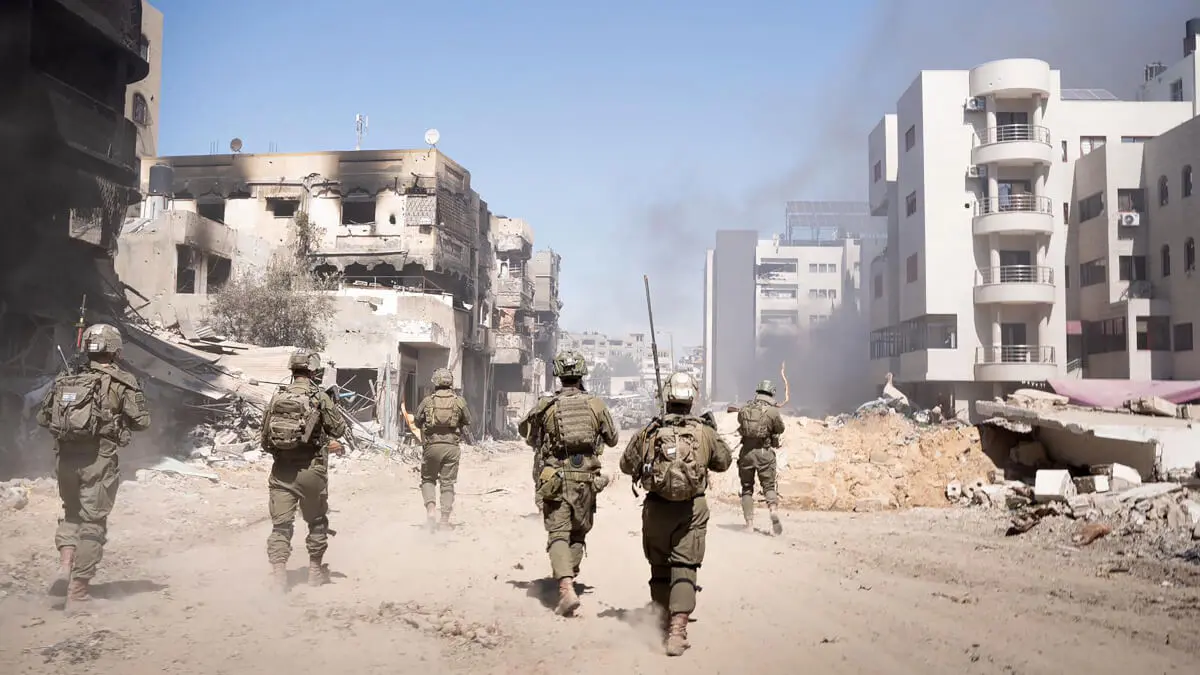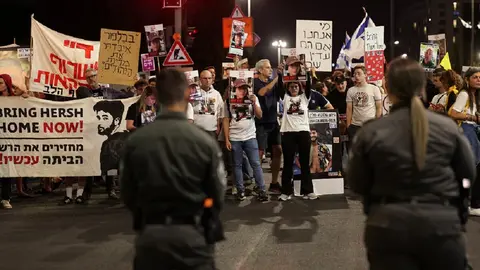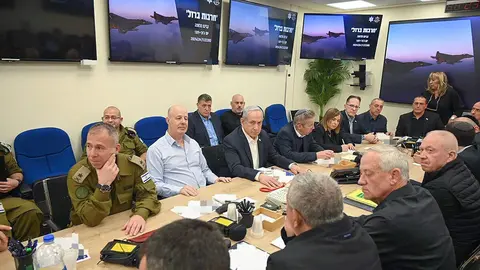Israel eliminates two Hamas commanders in the West Bank

- Hamas calls on Palestinians to "rise up" against Israel
- Despite international pressure, Israel maintains operation in Rafah
- Egypt agrees to send humanitarian aid to Gaza via Kerem Shalom
The Israeli air force has shot down Yassin Rabia and Khaled Najjar, two Hamas commanders, during an attack on an area in Rafah from where the terrorist group had launched several rockets at Tel Aviv hours earlier, setting off anti-aircraft alarms in central Israel for the first time in months.
Hamas releases footage of it launching a rocket barrage from southern Gaza's Rafah at Tel Aviv earlier today. pic.twitter.com/NDbcCEOmjj
— Emanuel (Mannie) Fabian (@manniefabian) May 26, 2024
In addition to Rabia and Nagar, more than 50 Gazans were killed in the attack, according to Hamas-controlled health authorities in Gaza. The Palestinian enclave's health ministry said most of the victims were women and children, while the Palestinian Red Crescent Society confirmed that the attack hit "tents of displaced people near the UN headquarters in northwest Rafah".
According to local accounts, an Israeli airstrike on people's tents in Rafah, near a UNRWA warehouse, killed over 30 Gazans, and teams are currently searching the surrounding regions owing to the severity of the airstrike. pic.twitter.com/6fa3pmDAUq
— Hamza🇵🇸 (@HowidyHamza) May 26, 2024
According to the Israel Defense Forces, the attack took place in an area where senior Hamas officials were meeting in Tal as Sultan, northwest of Rafah. "The attack was carried out against legitimate targets under international law, using accurate munitions and on the basis of accurate intelligence indicating Hamas use of the area," a statement said.
Israeli military authorities have also announced that they are aware of "reports indicating that as a result of the attack and the fire that was ignited, a number of civilians in the area were affected" and that "the incident is being examined".
The Israeli army has also provided information on the two eliminated Hamas leaders accused of terrorist activities in the West Bank. On the one hand, Yassin Rabia, Hamas chief of staff in the area, managed all of the Islamist group's activity in the West Bank.
The Israeli airstrike NW of Rafah earlier today killed the commander of Hamas' leadership in the West Bank, Yassin Rabia, and Khaled Najjar, another senior official. Both terrorists were deeply involved in directing and supporting West Bank attacks from Gaza. pic.twitter.com/NqR3XTEgjw
— Joe Truzman (@JoeTruzman) May 27, 2024
He "transferred funds to terrorist targets and planned Hamas attacks throughout Judea and Samaria. He also carried out numerous attacks in which IDF soldiers were killed," the statement said.
Khaled Najjar, meanwhile, was a senior member of Hamas' West Bank headquarters who planned shootings and other terrorist activities. "He transferred funds for Hamas terrorist activities in Gaza. He also carried out several deadly terrorist attacks in which IDF soldiers were killed," the Israeli army adds.
Hamas calls on Palestinians to "rise up" against Israel
Palestinian authorities in both Gaza and the West Bank have condemned the attack as a "massacre".
"Due to the horrible Zionist massacre committed this afternoon by the criminal occupation army against the tents of displaced people we call on the masses of our people in the West Bank, Jerusalem, the occupied territories and abroad to rise up and march against the ongoing Zionist massacre against our people," Hamas said in a statement.
Some of the video from Rafah tonight. Gathering more information now. pic.twitter.com/twWmau8EFs
— Trey Yingst (@TreyYingst) May 26, 2024
The terrorist group has been accused on numerous occasions of using Gazan civilians themselves as human shields, placing weapons in heavily populated areas or launching attacks on Israeli territory from public places. Indeed, the recent attack on central Israel was launched from near two mosques, according to the IDF.
The rocket launcher that fired 8 projectiles from the area of Rafah toward central Israel was situated near 2 mosques.
— Israel Defense Forces (@IDF) May 26, 2024
Shortly after the attack, the rocket launcher was struck by an IAF aircraft.
While we facilitate aid to the Rafah area, Hamas fires rockets toward Israeli… https://t.co/X0ti5trL36 pic.twitter.com/2Jt8ve8BT1
Meanwhile, the office of Palestinian Authority President Mahmoud Abbas accused Israeli forces of "deliberately targeting" the tents of displaced persons.
Despite international pressure, Israel maintains operation in Rafah
The attack comes amid strong international pressure on Israel to cease its offensive on Rafah, considered the last bastion of Hamas. Many of the hostages - both dead and alive - are also believed to be in the area. Israeli troops recently found the bodies of Shani Louk, 22, Amit Bouskila, 28, and Itzhak Gelerenter, 56, south of the Gaza city.
We are devastated to share that the @IDF recovered the bodies of three Israeli hostages who were kidnapped from the Nova Festival and held by Hamas in Gaza.
— Israel ישראל (@Israel) May 17, 2024
Amit Bouskila (28)
Shani Louk (23)
Itzhak Gelerenter (53)
There are no words.
May their memory be a blessing. pic.twitter.com/N8xEvUPBC2
Despite evidence of Israeli hostages in the area, the International Court of Justice has ordered Israel to "immediately" halt its military activities in Rafah. The president of the ICJ, Nawaf Salam of Lebanon, has stressed that the humanitarian situation in Gaza is "disastrous", and that the measures taken by Israel in Rafah such as the evacuation of civilians are not sufficient to "reduce the risk to which the Palestinian population is exposed because of the offensive".
Members of Israel's War Cabinet have rejected the ICJ ruling, insisting that they will continue to fight "to free the hostages and ensure the safety of citizens, anytime, anywhere, including in Rafah".
"The State of Israel embarked on a just and necessary campaign after a brutal terrorist organisation massacred our citizens, raped our women, kidnapped our children and fired missiles into the centre of our cities," Benny Gantz said.
The IDF says it destroyed a rocket launcher in southern Gaza's Rafah used by Hamas to fire a barrage of eight long-range projectiles at central Israel earlier today
— Emanuel (Mannie) Fabian (@manniefabian) May 26, 2024
A fighter jet hit the site, which the IDF says is located near two mosques. pic.twitter.com/3A2BFF8PKh
Egypt agrees to send humanitarian aid to Gaza via Kerem Shalom
In addition to the orders on Israel's military operation in Rafah, the international court also ordered Israel to "keep open" the Rafah crossing between Egypt and Gaza to allow the "unimpeded delivery" of humanitarian aid to the enclave.
The Rafah crossing was closed after the IDF launched an operation earlier this month to take control of the Gaza side of the crossing. Israel subsequently blamed Egypt for refusing to reopen the crossing, as Cairo does not want to open it as long as the IDF manages the other side.
#BREAKING Aid trucks have begun entering Gaza from Egypt through Israel's Kerem Shalom border crossing pic.twitter.com/QokZhrct4m
— Guy Elster (@guyelster) May 26, 2024
Despite the dispute, humanitarian aid began entering the Gaza Strip from Egypt through Israel's Kerem Shalom crossing on Sunday, days after Washington and Cairo agreed to reactivate supplies from Egypt.
Some 200 truckloads of humanitarian aid, including four fuel trucks, are expected to arrive in Gaza, Khaled Zayed, head of the Egyptian Red Crescent in northern Sinai, told Reuters. These convoys will arrive through the Kerem Shalom crossing after being diverted from the Rafah crossing.
Kerem Shalom, despite being a key entry point for humanitarian aid into Gaza, has been the target of recurrent attacks by Hamas, leading the Israeli authorities to close it at times.
Israel is making efforts to continue delivering extensive humanitarian aid into the Strip and to facilitate the ongoing entry and rotation of humanitarian teams.
— COGAT (@cogatonline) May 24, 2024
Yesterday, during the rotation of these teams, all of whom are foreign citizens, Hamas fired at the Kerem Shalom… pic.twitter.com/8IiEsrgDIF
On the other hand, northern Gaza receives aid through two land routes that Israel reopened during the war. More than 2,000 truckloads of aid entered Gaza through Israel last week, according to the Israel Defence Forces. This aid is sent after arriving at Israeli ports or being trucked through Israel from Jordan, The Times of Israel reports.










